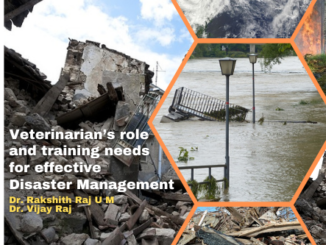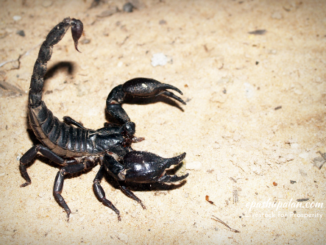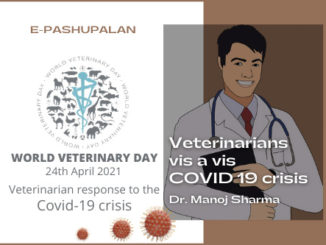Veterinarians or Veterinary doctor is being an integral and essential part of the global health with the help of livestock and animal owners. Their roles not only related to the health and welfare of animals but prevention, management and control of zoonotic and infectious diseases as well. Their role in ensuring the healthy food and its safety in no way can be ignored along with the food security f the human being to provide protein rich diet to all of us. Veterinary care for food animals ensures their good health and thus we get nutritious and palatable food in terms of milk, meat, eggs etc. This also supports agricultural livelihoods and the viability of our livestock farms. All these roles would rather make the routine work of the Vets but the current COVID-19 crisis has unmasked their potential and utility beyond that too in an effective way. To commemorate their role to the society, this year World Veterinary Day (WVD) is themed with “The Veterinarian Response to the Covid-19 Crisis” so that to create awareness and responsibilities by the Veterinarians about the COVID-19 pandemic scenario.
In early 2020, humans faced an almost un-precedented situation when a novel corona virus named SARS-CoV-2, causing a disease known as COVID-19, changed life around the most of the countries in world. The virus continues to cause death, illness, strain on health systems, societal disruption, and economic damage. The World Health Organization (WHO) described SARS-CoV-2 as “a new strain of corona virus that has not been previously identified in humans”. On 30 January 2020 the WHO declared the COVID-19 outbreak to be a “Public Health Emergency of International Concern”. On 28 February 2020 the WHO raised COVID-19 to the highest level of global risk. Many countries, including India, implemented measures that were aimed at reducing the spread of COVID-19, including restrictions on human movement, improved hygiene, and social distancing (henceforth referred to as physical distancing) to reduce human contact with the help of professionals either medicos or veterinarians and health workers they are collectively called as Corona warriors.
The recent Covid-19 lockdown has impacted the domestic poultry industry severely being the worst quarter in recent time. The industry incurred large net losses due to sharp decline in demand, realization and profitability. Rumor’s circulated in social media, linking poultry birds as possible vectors of the virus, further lead to the demand drop and hence realizations. The corona virus outbreak and the consequent lockdown have pushed the poultry sector in the country into a crisis with losses projected at Rs 28,500 crore beginning February this year.
COVID-19 has reminded us that “we are one” and an opportunity has come to refocus on our health policies. Across the world health oriented research transits from basic sciences to the Veterinary and medical fields. Various sectors like medical, pharmaceutical and veterinary offer direct health services while other related sectors like agriculture, forestry and environment provide indirect services to the animals and human. All these fields have been forced to communicate, collaborate and coordinate activities for “One Health” initiative. During the current COVID-19 crisis when everything looks bleak, a ray of hope is visible through the collaborative and coordinated efforts of professionals from diverse fields to mitigate this pandemic with the sincere efforts of medicos, health workers along with the Veterinarians also to serve the society as well as the animals against such pcovid-19 pandemic scenario. Such joint efforts have finally turn fruitful when frequent tracing, testing and treating facilities were created and now COVID-19 vaccines were developed in India. In fact, animal health plays an important role in improving the quality of life and as a driver of economic growth. Though, now a days a new wave of Covid-19 has started and has affected many more lives and economies again, furthering of set efforts and SOPs already proposed need to be followed.
The most of the Veterinarians across the globe are engaged in research to understand the ecology of emerging zoonotic diseases that are transmitted between animals and humans. COVID-19 being an infectious disease with animal origin, joint efforts from vets and other associated professional like medicos and health workers. It is important to mention that COVID-19 vaccine cannot be considered to be 100% effective in everyone. Vaccinated people are also prone to infection, albeit with much smaller chance. They may not become sick but can contract virus and spread to the other people. Recently, COVID-19 vaccine (Carnivac-Cov, Russia) too has been developed for vulnerable animals (cats, dogs and minks) with a motive to prevent mutation of the virus.
In India the Veterinarians professionals are well equipped with the scientific knowledge to handle the virus and perform associated diagnostic tests in most of the state and central veterinary institution and research centers. As such the Vet man-power and their hospital machinery have really helped in testing COVD-19 timely.
A combination of ecological disturbances, landscape changes, human behaviors, and public health factors contributes to the frequency of contacts between humans and wildlife, and such contacts pose a risk of exposure to trans-boundary animal viruses. For the control of infectious diseases in animal populations, as a Veterinarians we should advise to adopt the followings-
- Biosecurity measures: To prevent the introduction of viruses to populations.
- Surveillance via diagnostic testing: To identify infected animals.
- Culling of infected animals from uninfected populations.
- Vaccination for long-term control by promoting immunity.
These approaches have proven to be effective and successful in many countries when used to contain some trans-boundary epizootics; foot-and-mouth disease, African swine fever, and Newcastle disease, to name a few. In this period within the COVID-19 pandemic, societies and human behaviors are quickly changing, and to accommodate these changes, the traditional roles of veterinarians should evolve accordingly. Veterinarians should have significant roles in maintaining healthy ecosystems and protecting animals and humans from emerging and trans-boundary infections. Such roles should be based on the One Health framework, the application of which can reduce economic impacts on the livestock industry and food supply.
Advisory for the livestock owner
As a Veterinarians it is our duty to restrict the movement of visitors to the livestock farms practice biosecurity measures. Strength of farm workers/ animal shed attendants should be minimized with maximum output per worker without any ill health. The workers engaged in livestock farming they should wear mask advised to sanitize with appropriate sanitizer and maintain social distance while cleaning animal shed, chaffing and distributing fodder and milking dairy animals etc., If any worker is found ill, he should be channelized to take standard health measures to avoid any possibility for disease spread. The animal farm equipment’s and accessories should be cleaned and sanitized regularly.
Trading of livestock should be stopped, if highly needed should be managed through e-trading. In case of purchase of animals, animals should be quarantined for a period of three weeks before introduction into existing herd.
All human resources at livestock farms should be advised to install Arogya Sethu App mandatorily to know about the risk status. The workers should maintains a safe distance from other i.e. more than 6 feet and wear full sleeve clothe. Delivery of milk and milk products without human contact should be done by leaving the product at door or maintain a gap of at least 6 feet. Contact with common touch points such as door bell, door handle etc. should be avoided and if touched hands should be sanitized thoroughly. At the sale counter, wear the mask and hand gloves and ask the customers to maintain social distance. If vehicle used for delivering milk or milk products entered an area marked as hotspot, it should be thoroughly clean before another use.
Any Employee who has fever along with dry cough and facing shortness of breath should immediately be quarantined and referred to doctor. Staff commuting to work area in Public transport shall avoid the same. If using public transportation, maintain a social distance, wear a mask and sanitize the hands frequently and avoid touching the face. Disposal tissues should be used for sneezing or coughing and proper disposal of used tissues should be there and hands should be thoroughly washed before handling anything else.
The farmers should tried to Convert of surplus milk into value added products like butter milk, Ghee, paneer, chhanna production, concentrated products like Khoa, Kulfee preparation and utilization of milk by-product like skim milk can be fermented for curd/lassie or may be used for flavored milk production or it may be fed to calves if remains unutilized or casein can be prepared to sale later on.
The butchers and personals involved in meat industry should maintain clean and disinfect the knives used for meat cutting in hot water at the temperature of >82°C for few seconds. Meat processing facilities must meet the basic hygienic standards in order to ensure and maintain clean and hygienic working conditions. High temperature cooking (pressure cooking preferable) regimen should be followed. The personnel involved in processing must wash their hands between handling different items such as knives, raw and cooked meat, mixing bowls, spoons etc. All the equipments and instruments in the meat processing plant must be sanitized after every shift. Wash surfaces with detergent and water at 60°C and then sanitize by applying very hot potable water (75°C) for at least 2 minutes. Then disinfect surfaces with suitable disinfectant. For this chlorine or quaternary ammonium compounds based sanitizers can be used.
The persons involved in handling of eggs should wash their hands often with soap and water for at least 20 seconds. Egg should be cleaned using potable detergent water or egg soap water (pH 11.0) like egg wash powder, an alkaline chlorinated foam control powder. After washing, eggs should be sanitized using chlorine based sanitizer (50-200ppm). Eggs should be transported in a closed container and no other items should be permitted for transportation in the same vehicle and vehicle should be regularly disinfected before loading and after unloading.
Suggestions during COVID-19
There is a need for a national framework for risk assessment of animal welfare, across all sectors, by the Veterinarians to identify potential risks to animal welfare, not just animal disease risks. There is a need for clear communication channels among the Veterinarians, industries and Organizations that deal with animals and their welfare. Veterinarians Contingency plans for animal welfare – Sectors that are responsible for the care of animals need crisis response plans in place, covering everything that could disrupt animal care. Risks include natural disasters, biosecurity events, supply chain shocks, Labor disruptions, movement restrictions on personnel, financial hardship, feed supply shortage, and limitations to transport and processing capacity. Contingency plans must cover financial hardship, and they need to identify resource reserves that can be used to ensure that the care of the animals is not compromised. Sectors should document the arrangements that were developed for the COVID-19 pandemic and incorporate these into contingency plans. The challenges to human mental health during a crisis may compromise one’s ability to provide adequate care for animals or to perceive when animal welfare is at risk. Support systems for animal care providers during times of crisis should be developed by each sector.
Conclusion
The Veterinarians are a center of wheel for communication and collaboration for animal protection organizations, animal health, the livestock production and processing sectors, the aquaculture, wildlife, and animal racing sectors, the zoo and aquarium sector, the animals in research and teaching sector and the companion animal sector. Veterinarians plays a very significant role to maintain global health, economics of nation with the help of livestock and animal owners and their valuable various products and byproducts. True Veterinarians ensuring the healthy food and its safety for the whole society. So as Veterinarians, on the occasion of this world Veterinary Day, we should take the oath to serve the society as well as animals by performing our sincere duties with full responsibilities.






Be the first to comment